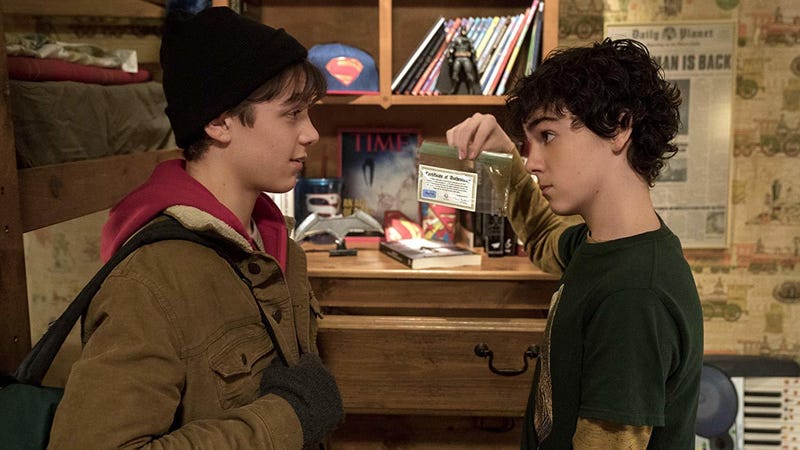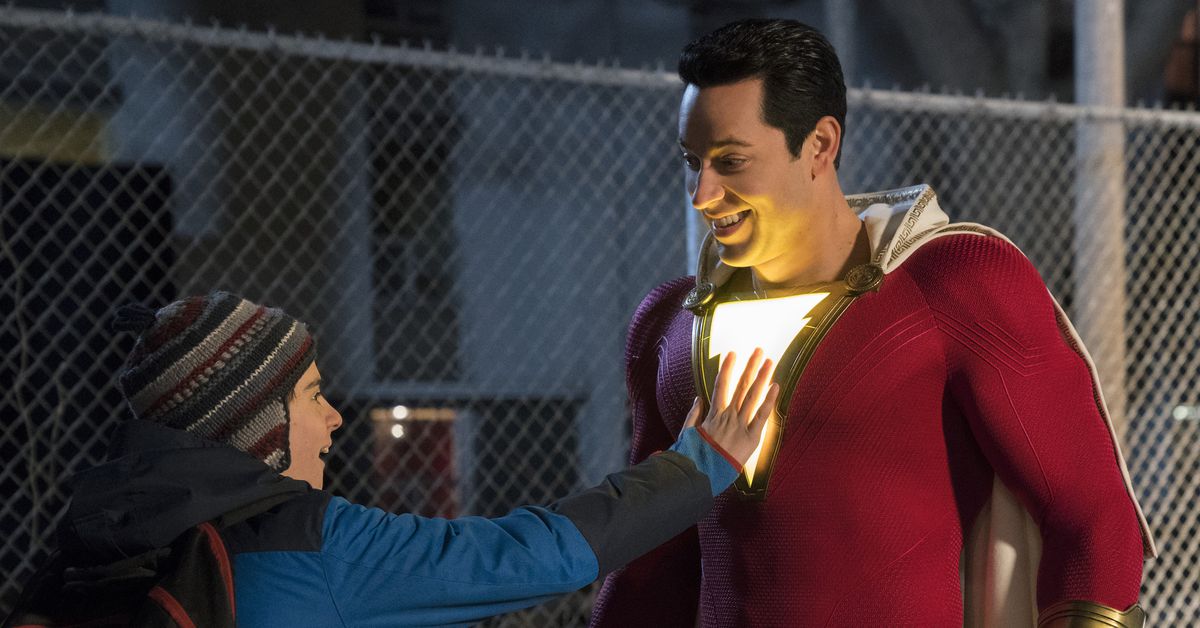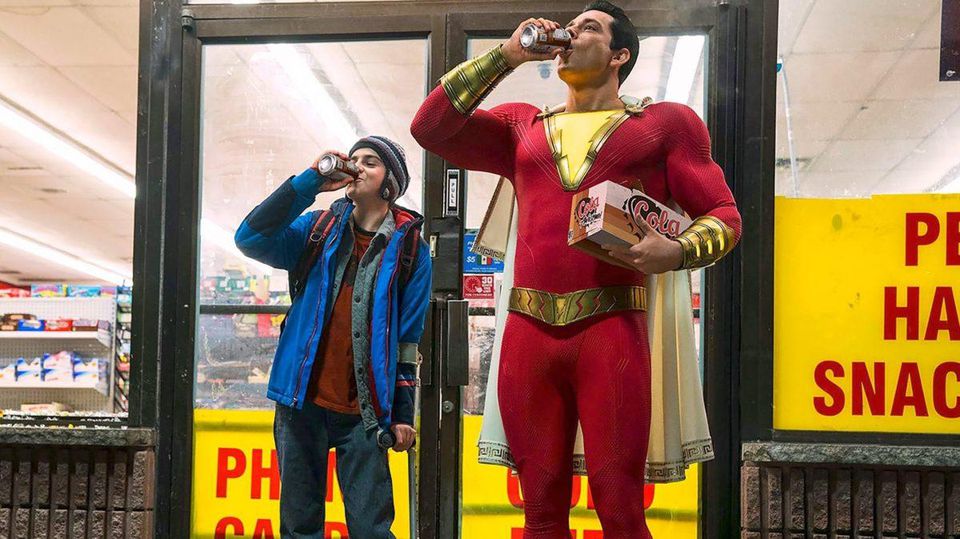Image credit to Forbes.
Spoilers for Shazam (page 1) and Hotel Mumbai (page 2). All star ratings are out of 4.
Shazam (David F. Sandberg): * ½
After years of receiving criticism that their DC films are excessively dark and gloomy, Warner Brothers has released Shazam, a superhero flick that tries to balance fun and seriousness. In terms of achieving this balance, Shazam succeeds by having little entertainment or dramatic value. This picture’s idea of a good time is being a lazy derivative of other genre works and its vision of an emotional movie is a rushed one.
Shazam’s protagonist is Billy Batson (Asher Angel) a teenager accidentally separated from his mother as a child, who constantly attempts to reconnect with her. Rather than brood like Clark Kent in Man of Steel or Bruce Wayne in Batman v. Superman, Billy keeps an optimistic attitude much like Peter Quill in Guardians of the Galaxy. He plays pranks, cracks jokes, and rehearses exactly which words he’s going to say when he reunites with his mother, even though his hundreds of searches have ended by encountering women who aren’t his mom.

With the cops discovering Billy after his latest exploration, he is placed in a foster home run by Victor (Cooper Andrews) and Rosa (Marta Milans). Following this, the film borrows from other recent, acclaimed comic book fare, mainly Marvel pictures like the aforementioned Guardians. Just as Quill is surrounded by a team of amusing, quirky people who serve as his surrogate family, Billy is also grouped with seemingly hilarious, odd teenagers and children who obviously represent a possible new family for him to join. However, while Shazam might steal a lighthearted vibe and plot points from Marvel, it doesn’t replicate that studio’s execution. Say what you will about the MCU (and I have) but in those movies, the humor derives from each figure’s personality, making the characters more funny, human, and likable. In this work, the opposite happens: characters are defined by the punch-lines they serve. So a person—Darla (Faithe Herman)—who is supposed to hysterically hug and talk too much mostly just embraces and chatters in whatever scene she is in; meanwhile, a boy—Pedro (Jovan Armand)—who incredibly never speaks usually remains silent whenever he’s on screen. This type of simplistic comedy means the figures in Shazam don’t produce laughs or entertainment, don’t feel human, and don’t convince as an example of a nurturing family.
Shazam’s lazy pilfering of other comic book films’ funniest aspects extends beyond Billy’s family life and encompasses his journey as a superhero. After standing up to bullies for his foster disabled brother Freddy (Jack Dylan Grazer) the most fleshed out character of Billy’s surrogate siblings, Billy is summoned by a wizard (Djimon Hounsou) who gives him a bunch of superpowers, transforming him into an older superhero named Shazam (Zachary Levi). Following this encounter, Billy and Freddy run through tests to figure out what his powers are. A montage where Billy tries and fails to fly, runs at insane speeds, survives fire, and shoots lasers unfolds. Such absurd sequences are a staple of the comic book film genre. Two of the most successful examples are Batman Begins and Iron Man in which Bruce Wayne and Tony Stark struggle to assemble sturdy or hi-tech gear that will help them fight crime only to discover that their materials are inefficient or keep breaking down. However, Shazam’s montage doesn’t elicit the same joy because it misses that the comedy here isn’t over the heroes’ repeat failures, but in how they seek to discover precise methods to insulate themselves from pain, but then realize that such exactness and safety are impossible to achieve while battling violence. Billy, on the other hand, doesn’t expend energy and effort calculating how to maximize the benefits of his powers and he doesn’t bother worrying about how to keep himself secure from their possible side-effects. Shazam believes that having him stumble on to what he can and can’t do is entertaining enough. In turn, much like with the work’s characters, its privileging of broad jokes over sharp humor makes its superhero aspects dull and alienating.

Shazam’s emotional moments land with as much of a dud as its fun ones. Here, the problem isn’t a lack of effort, per se, as much as a lack of time. The work crafts storylines and scenes that can be very poignant, but moves through them too quickly to evoke pain, heartbreak, or inspiration. Take the plotline of Billy reuniting with his mom. On the page, all the ingredients for an upsetting experience are there: the searches for her ending in failure, the running away from foster families to find her, the threat that this desire poses to Billy’s new family, the way that he doesn’t think he deserves love for losing her, and the worry that she won’t care for him even if he finds her. However, the possible tension and sadness here remains to be imagined; Shazam rushes through depicting and conveying these elements so quickly that they never impact as they should. The decade of frustration and sorrow Billy must’ve felt being alone is reduced to one flashback, the failures to fit in past adopted homes is summed up in a few lines of dialogue, and Billy’s lack of self-worth is something he just announces every few scenes—it’s not depicted through interactions with an environment or visuals expressing loneliness. His difficult and hurting existence is blazed through, never fully seen, never lengthily laid out to experience, never framed as something to feel. The use of time, a tactic emotional superhero flicks like Batman Begins and Black Panther have relied on to richly and powerfully examine sons grappling with chaos after a parent’s death, is not an aspect Shazam prioritizes. Like with its comedy, the movie’s emotional moments feel empty and disappointing.
With Shazam, DC and Warner Brothers aim to get rid of their reputations for making depressing and sour comic book movies. Instead, Shazam wants to entertain while producing emotional moments. Sadly, despite studying previous films in its genre and trying to duplicate their success, this picture never pays enough attention to the craft, the effort, the complexity of those works. Rather, it is a lazy copy that ends up feeling like any other live-action DC product since The Dark Knight trilogy ended: boring.

One thought on “SHAZAM & HOTEL MUMBAI Reviews”